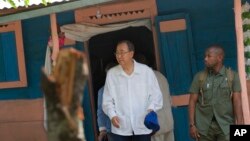A U.S. District Court judge heard oral arguments Thursday in a lawsuit brought by victims of Haiti’s cholera outbreak, who are seeking compensation from the United Nations.
The plaintiffs blame a contingent of Nepalese peacekeepers for bringing the disease to their nation after the 2010 earthquake.
The suit was filed on behalf of five Haitians and Haitian-Americans whose family members died of the water-borne disease or who were infected with it.
They allege that U.N. peacekeepers who were sent to the country after the devastating 2010 earthquake contaminated a branch of the Artibonite River with cholera. The river is the country’s main water source for tens of thousands of Haitians.
Subsequently more than 8,500 people died of the disease, which can cause severe diarrhea and vomiting, and hundreds of thousands more were sickened.
The United Nations has never taken responsibility for the crisis and is claiming immunity in this lawsuit.
In July, Secretary-General Ban Ki-moon visited Haiti and spoke to survivors and families of those who died, telling them he believed that “the whole international community, including the United Nations, has a moral duty” to stem the further spread of cholera.
“This case is about whether the United Nations can essentially operate with impunity when it has refused to provide any kind of remedies to the victims,” said Beatrice Lindstrom, one of the attorneys for the plaintiffs.
She told reporters after the hearing that the United Nations has a clear legal obligation to provide remedies for people it has harmed.
Spokesman Farhan Haq said Wednesday that the United Nations will not attend the court proceedings.
“The United Nations has maintained its immunity from legal process in respect of this lawsuit. In light of this, the United Nations will not appear in court.”
U.S. government lawyers, representing the host country and a party to the treaty on immunity, addressed the judge. They argued that the United Nations has absolute immunity unless it has expressly waived that immunity. They suggested the proper venue for pursuing the case would be the International Court of Justice.
It will be up to the judge to decide whether plaintiffs can pursue the case in a U.S. court.
The Haitian government has not helped its citizens pursue U.N. compensation.
Mario Joseph of the International Lawyers Bureau in Haiti told reporters the government will not say the U.N. is responsible for the outbreak, and has forbidden public hospitals from giving cholera victims their medical records.
appealed directly to the U.N. chief.
“The United Nations stands for the promotion of human rights for all, and that should include Haitians. So we ask the secretary-general to listen to Haitians when they ask for justice in this case,” said plaintiffs’ attorney Lindstrom.
The United Nations said it has worked to improve water, sanitation and health in Haiti, and that its efforts are paying off as cholera cases are down 75 percent over last year.




